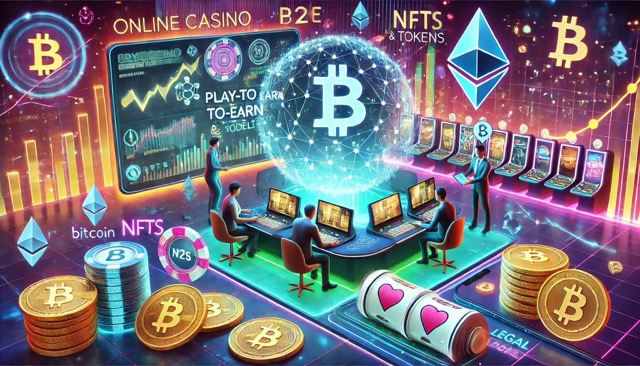
The iGaming industry is undergoing a shift, with the integration of cryptocurrencies and the emergence of play-to-earn (P2E) gaming models at the forefront of this evolution. These advancements introduce new opportunities for both operators and players while bringing significant challenges, particularly in regulatory compliance and operational logistics.
Cryptocurrencies in iCasinos: Opportunities and Challenges
Cryptocurrencies are increasingly adopted by online casinos, offering advantages such as faster transactions, greater privacy, and access for users in regions with restrictive banking environments. However, this integration is not without its complexities.
● Faster Transactions: Cryptocurrencies eliminate the need for intermediaries, allowing for near-instantaneous deposits and withdrawals. This convenience has become a key selling point for players who value seamless financial interactions.
● Privacy and Anonymity: Cryptocurrencies provide an additional layer of anonymity, enabling players to maintain their financial privacy while engaging with iCasinos.
● Global Accessibility: Digital currencies enable players in regions with strict banking regulations to participate in global gaming platforms, broadening the reach of online casinos.
Despite these benefits, the adoption of cryptocurrencies presents challenges, particularly in regulatory compliance and risk management:
● Regulatory Uncertainty: The use of cryptocurrencies in gambling operates in a patchwork of legal frameworks globally. Some jurisdictions embrace the innovation, while others impose strict prohibitions, creating an inconsistent environment for operators.
● Market Volatility: Cryptocurrencies are inherently volatile, which can affect players’ balances and operators’ cash flow management. Sudden price fluctuations in digital assets can lead to unexpected losses for users and operational complications for casinos.
● Security Risks: Although blockchain technology provides strong security, the broader crypto ecosystem has vulnerabilities, such as phishing attacks and wallet breaches, which pose risks to players and operators alike.
Play-to-Earn (P2E) Gaming Models: A New Economic Opportunity
The rise of P2E gaming has introduced an economic model where players are rewarded with tangible digital assets for their in-game activities. This is a departure from traditional gaming, where player engagement generates value only for the operator.
In P2E games, players earn cryptocurrencies or non-fungible tokens (NFTs) through gameplay. These assets can often be traded, sold, or used within broader gaming ecosystems. For example, a player might earn tokens by achieving specific objectives or winning competitive matches. These tokens hold real-world value, creating a new dynamic between time spent in-game and economic reward.
● Engagement and Retention: Incorporating P2E mechanics into iCasino platforms can attract a new demographic of players who value earning rewards through skill and strategy.
● Broadening Revenue Streams: By creating in-game economies tied to cryptocurrencies or NFTs, casinos can establish additional monetization channels, such as transaction fees for asset trades.
● Cross-Platform Ecosystems: P2E elements encourage players to remain within a unified ecosystem, increasing lifetime value per user.
● Regulatory Scrutiny: P2E models often blur the lines between gambling, gaming, and financial services. This ambiguity complicates compliance efforts and raises questions about consumer protection.
● Sustainability of In-Game Economies: If in-game rewards lose value due to over-issuance or declining demand, player trust and engagement can quickly erode.
● Technological Demands: Building secure and scalable blockchain infrastructures to support P2E mechanics requires significant investment and expertise.
Regulatory Uncertainty: A Key Hurdle
One of the most significant barriers to widespread adoption of cryptocurrencies and P2E models in iGaming is regulatory uncertainty. The challenge lies in navigating global jurisdictions with varying stances on digital currencies and gaming practices.
● Undefined Legal Categories: Cryptocurrencies and P2E elements often exist in legal gray areas, making it unclear whether they should be regulated as gambling activities, financial instruments, or both.
● Consumer Protection Requirements: Regulators are increasingly focused on ensuring that players are not exploited by misleading mechanics or unfair systems within P2E games.
● AML and KYC Compliance: The integration of cryptocurrencies into iGaming requires robust anti-money laundering (AML) and know-your-customer (KYC) protocols to mitigate risks of financial crimes. Failure to comply with these requirements can lead to severe penalties for operators.
The integration of cryptocurrencies and P2E mechanics in iGaming presents an opportunity to redefine how players engage with online casinos. However, achieving long-term success will depend on how operators navigate the associated risks and complexities.
● Balanced Implementation: Operators must strike a balance between innovation and compliance, ensuring that new features do not alienate regulators or compromise player trust.
● Regulatory Collaboration: Engaging with policymakers can help shape a more cohesive regulatory framework, benefiting both operators and players.
● Continuous Innovation: As technology and player preferences evolve, staying ahead of trends will be critical for maintaining a competitive edge.
By embracing these changes thoughtfully, the iGaming industry has the potential to unlock new markets, enhance player experiences, and create more sustainable revenue models. However, success will require balancing innovation with responsibility, ensuring that the integration of cryptocurrencies and P2E models benefits all stakeholders in the ecosystem.








